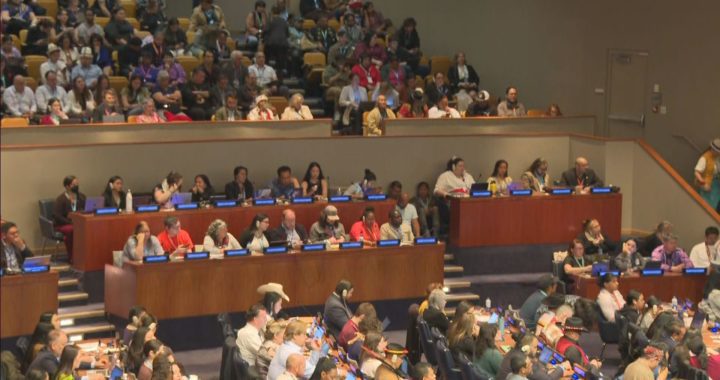Laurie Hamelin APTN NewsJust days after the Federal Court turned down the ‘Namgis First Nation’s bid to prevent the restocking of Swanson Island fish farm, a restocking vessel began filling the open-net pens with juvenile Atlantic salmon, known as smolts, on Monday.The ‘Namgis First Nation filed for an injunction against Marine Harvest, the world’s largest producer of farmed Atlantic salmon, to block the company from transferring up to one million smolts.Swanson Island fish farm, off northern Vancouver Island, is located in ʼNamgis’ traditional territory.The ʼNamgis say the fish farm is operating without their consent.They believe that open-net salmon farms affect wild salmon, and they want the Swanson Island farm gone.Tsatsaqualas Ambers was out on the water monitoring the Orca Chief as it restocked.”This situation is very urgent. We are fighting a big battle out here,” said Tsatsaqualas.Last October, Tsatsaqualas set up camp outside of B.C. Premier John Horgan’s constituency office in solidarity with the Swanson Island occupation.A collective of First Nations in B.C.’s Broughton Archipelago, including the ‘Namgis, want to see all the fish farms in the area removed.They’re putting pressure on the new NDP government to pull fish farm tenures, which are up for renewal in June.”As a matriarch I have the responsibility to protect the next seven generations,” said Tsatsaqualas.Last Friday, Justice Michael Manson rejected the ‘Namgis’ application for an injunction based on timing.Manson said the application was filed too late.”The court’s decision was heartbreaking,” said Hereditary Chief Ernest Alfred.”We have to abide by the ruling. There is very little we can do about it.”Evidence presented in court proved that Marine Harvest had informed the ‘Namgis on December 21, 2017 that they intended to restock Swanson Island in early spring.In Manson’s 41-page decision, he stated that the application for an injunction was not filed until March 9, 2018, “mere days before the transfer was set to begin.”The judge said the late notice prevented Marine Harvest from finding enough space for the smolts in its other B.C. fish farms.”We have been very open and transparent about our production plans in the area. We provided the local leadership with our stocking plans,” said Ian Roberts, Director of Public Affairs for Marine Harvest.”We can’t just immediately cease operations as we deal with a live animal that needs to enter the marine salt water environment when the fish is ready.”Marine Harvest testified that a delay in the transfer of the smolts could be deadly, potentially costing the company over $2 million dollars.But Alfred doesn’t agree with the Manson ruling.”How can he say we are too late? We have been here occupying Swanson Island since August,” said Alfred.”We came to force the government to listen to us, to make immediate changes. We have been telling everyone that we want the fish farm out, but it has gotten us nowhere.”As part of a broader application, the Namgis had also applied for an injunction against the Minister of Fisheries and Oceans asking for a judicial review of federal policy that does not require fish to be tested for piscine reovirus or heart and muscular disease before fish are transferred.Although the judge stated that there is a ‘likelihood of harm’ from fish-borne disease, a separate hearing is needed to consider the ‘Namgis’ application for judicial review.”It is my opinion that the underlying application for judicial review should proceed as expeditiously as possible,” Manson said.As of last week, our neighbours down in Washington state signed a new law that will force salmon farms to pack up by 2025, when their leases expire.First Nations opposed to net-pen aquaculture believe that the B.C. government has no choice but to follow suit.









